Since 1985 students and teachers of the GLTC course have regularly performed classical plays. The texts below are an adaptation of the #throwbackthursdays, which appeared on the Classical Languages Facebook page in 2017. Would you like to know more about the history of the classical language theater in Leiden? In 2020, the book 'Van Kikkers tot Kindermoord' was published about 35 years of theater by Leiden classicists. For more information, see the 'merch' heading on this website.
1985 – 1988 – 1990 – 1996 – 2001 – 2005 – 2008 – 2010 – 2012 – 2014 – 2016 – 2018
1985 - Aristophanes' Frogs
In 1984 the Classics students in Groningen performed saterplay 'the Cyclops' by Euripides. This made professor Peter Stork wonder why this was attainable in Groningen but was not done by the students in Leiden.
His students did not let that happen so easily. Even before the summer break an ambituous though feasible plan was made: a theater performance of the Frogs by Aristophanes. There was a lot of enthusiasm. In the summer many students helped translating the piece and in the following academic year the piece was rehearsed, costumes were made, the decor was built, and the music was composed.

The play premiered on the third of April 1985 and was entirely sold out. Edu van Berkel wrote in the Frons (volume 5:5) the following review:
'A personal impression: After a static start in which the protagonists Dionysos (Hans Paanakker) and Xanthias (Jacqueline Kuijpers) swerved around each other and the audience still had to get into the story, one joke followed the other. The dazzling scene with the inflatable raft, in which a bumbling Dionysos was transported to relaxation centers by a grumpy Charon (Robert Brinkema). Now, I finish with a quote from the review written by Dick van Teylingen in the Leidse Courant, which does not only do justice to the play, but also to the actors: "The classicists made it into a spontaneous and lively play, and it was noticeable they had fun while doing it".'
1988 – Aristophanes’ Archanenses
The performances of the Frogs were such a big success, that two years later the decision was made to perform another comedy. The committee was formed, (Dorien Beurskens, Frans Blom, Inge Huijding, Germaine Smulders, Tanja Verhey and Lidey de Vries) and the play was chosen: the Archanenses by Aristophanes. Again the play was entirely organized by students. Nine students translated the text, Florence Fabricotti composed the music and Michel Buijs directed the play.
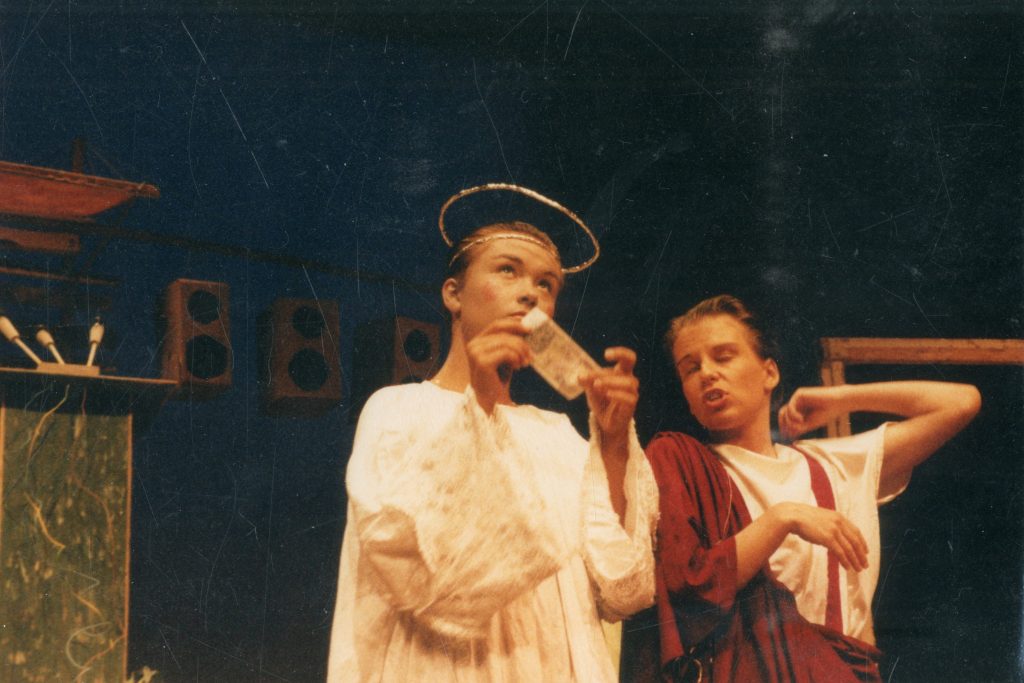
The play premiered on the fifth of May 1988. Again a Frons reporter, Petra Kalshoven, was there to write a review (Frons 8:5):
'In a succession of short scenes, the comedy got laughs. Dorien Beurskens made a splash in her role of Amphiteos, dressed as a besotted angel charged with arranging a private peace treaty for Dikaiopolis. Ilja Pfeiffer was convincing as the Persian envoy, leaning back relaxed in his sedan chair made of a tub. The Bardoul brother had no trouble with their Vandal role in their baseball outfit. (…) The enthusiasm of the players was immediately evident from their lively play. The large number of first and second year students among them made me more than hopeful that the tradition (can I even call it that?) that started three years ago with the performance of the Frogs and is now such a more than worthy successor got into the Acharnenses, will be continued without too long a wait!'
1990 – Aristophanes’ Ploutos
Petra Kalshoven's hopeful prediction soon turned out to be true. In 1989, a committee was formed for the third time, this time consisting of Caroline Bik, Astrid Herremans and Corinna Vermeulen, who announced in the June Frons of 1989 that Aristophanes' Ploutos would be performed in May 1990: 'The spark has flown. What had only manifested itself as an itch in the hands about a month ago during the 'Integrated Activity' lectures, has been transformed into a real, creative certainty.' Direction was in the hands of Dorien Beurskens, while once again Florence Fabbricotti, in collaboration with Richard van Dijk and Wouter Kool, was responsible for the music.
After the premiere on May 4, 1990, the now traditional review in the Frons (10:5) also followed:
'Dorien Beurskens has given this money-conscious comedy an inventive twist. The play opens with a bank manager. When he has become too nervous because of the unpleasant situation where someone is begging for financial help with his last quarter in one ear and stock market reports are being honked in the other ear, he collapses on the computer keyboard and has a dream. (Two telephones? Excess is harmful!) The dream is Aristophanes' Ploutos, in which he himself is Wealth. (Inge Huijding played both roles in an excellently heavy-handed and irritable way. Nice!) When he comes to again, 'the ring is closed', as classicists like to see it so eagerly, and the bank manager comes to the same insight as Wealth: that he has enormous has a lot of power.'
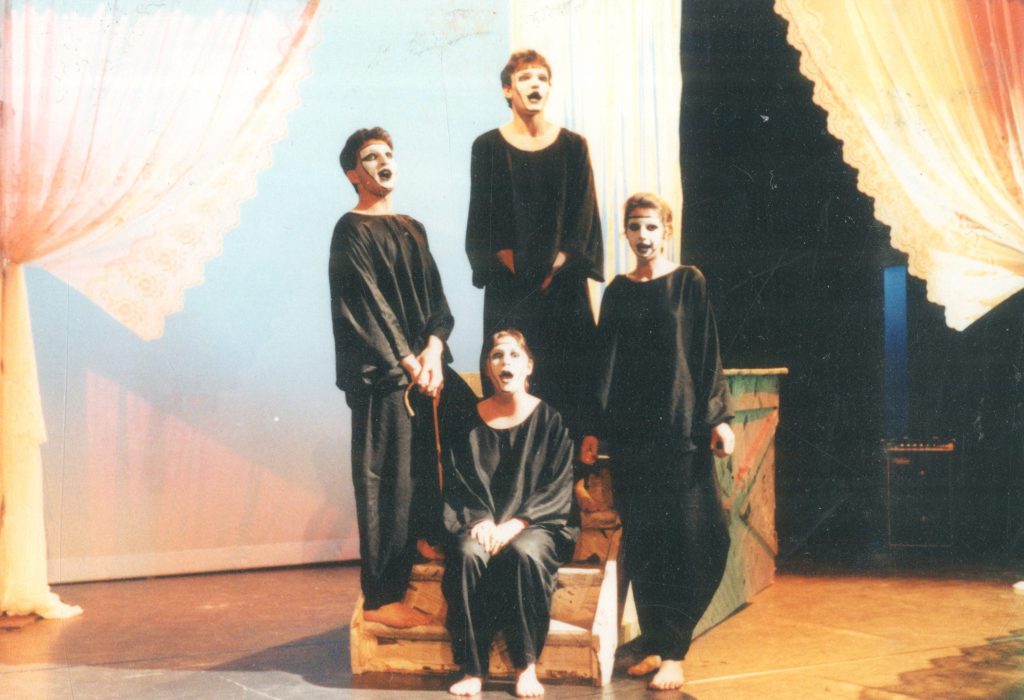
Klazinus van de Rotte, Nicole Roskam and Cecile Gieben
1996 – Aristophanes’ Lysistrata
After the performance of the Ploutos, the theater tradition suddenly seemed to come to an end. There was no shortage of attempts: at the beginning of 1992 there were plans to perform Aristophanes' Women's Parliament in 1993, but rehearsals never seem to have happened. In April 1993 another attempt was made to stage a production, the performance of which would take place in June 1994, but this also appears to have been unsuccessful.
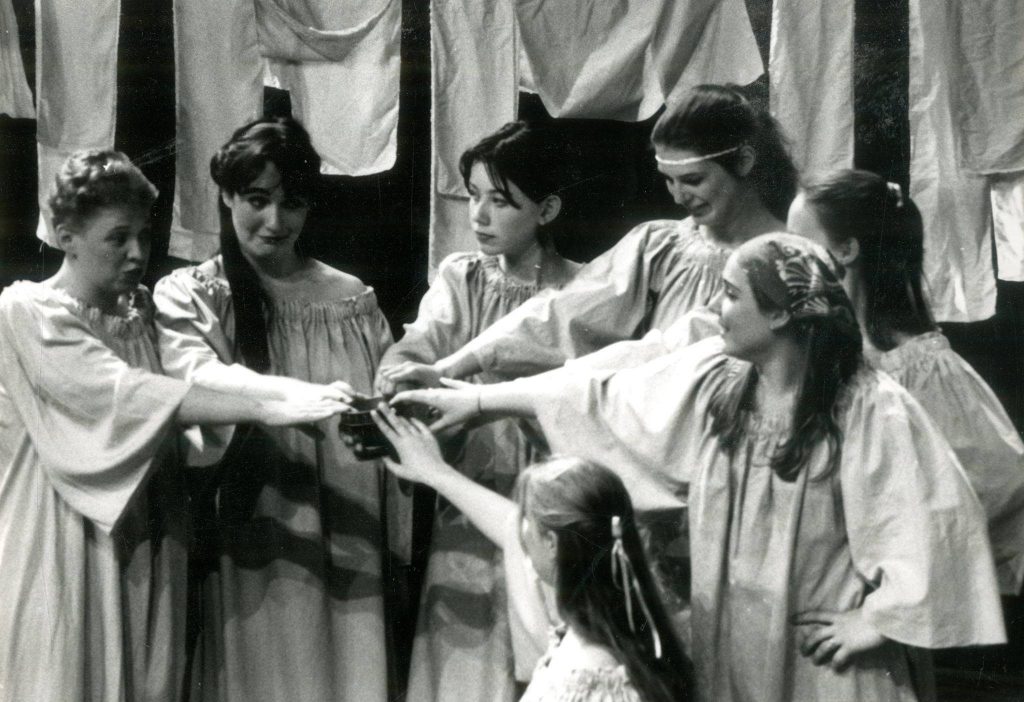
At the end of 1994/beginning of 1995, Mariëlle van der Beek, Henrike Florusbosch and Welmoet Wels made a third attempt: they planned to perform Aristophanes' Lysistrata in the spring of 1996. This attempt was successful: on May 1 and 2, 1996, performances took place in the LAK theater, after which a small tour was made to four secondary schools in the region.
The piece was reviewed by Robert Langelaan in the Frons (16:3):
“Two thousand years ago, the key to success was already known: sex sex sex. This became apparent once again during the performance of the Lysistrata, a piece by the successful comedy poet Aristophanes. (…) Kalonike (Vera van Karsen) was quietly having her breakfast/lunch/dinner with her newspaper, when Lysistrata (Hannah 'I do it for fun' Groos) burst in, feeling out of sorts, and yelling at her peers in Greek. For the morons among us, the audience requested that the rest of the piece be played in Dutch, and to my astonishment, that request was complied with. (…) Anyway, the plans for the sex strike were made, and women from all over Hellas took part, no matter how difficult it was for them.”
2001 – Euripides’ Alkestis
Even after the Lysistrata, it took a number of years before a new production was started. It was once again Mr. Stork who got the theater ball rolling: during the second-year comedy block, the first plans for a new play were made. Lisette Middelburg, Janneke de Vlas and Maureen van Hee formed a committee and chose a play: the tragicomedy Alkestis by Euripides, probably originally performed as a satyr play. In the summer the play was translated and a script was put together.
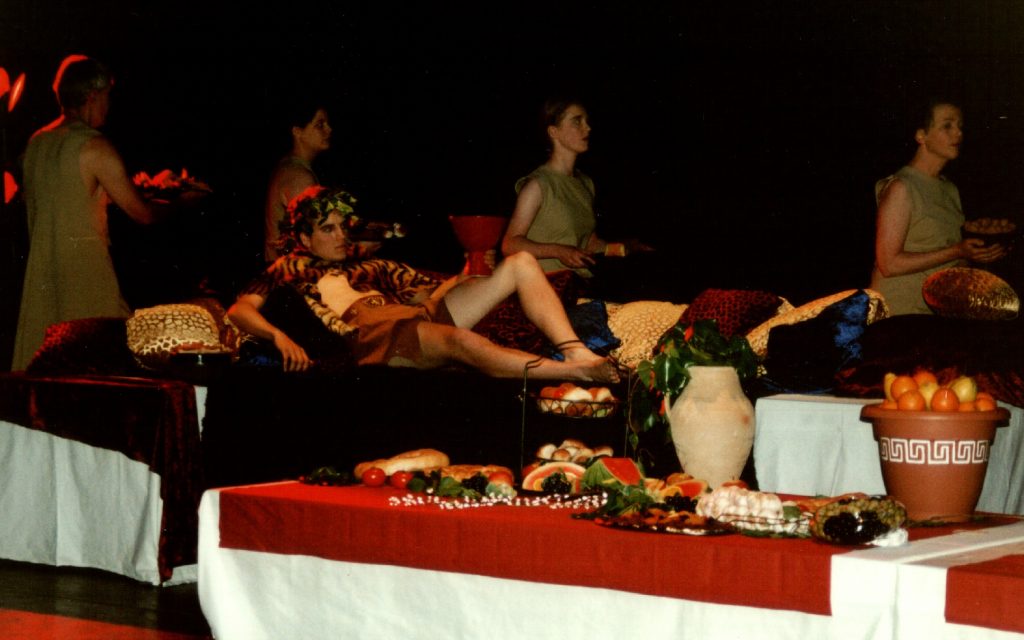
Although several students had indicated before the summer recess that they would like to participate in the play, this enthusiasm suddenly became much less after the summer recess. Fortunately, several history students proved more than willing to fill in the gaps. The performances took place at the end of May. The most important role in the play, Thanatos, was played by Wilbert van Dijk, who also played Herakles. Michel Buijs wrote about his role in his review of the Alkestis in de Frons (21:3):
“Without the presence of Wilbert van Dijk (Herakles and Thanatos) in the cast, the performances of the other actors would lack relief. (…)Beautiful choral passages set to music by Tazuko van Berkel and Edwin de Sterke, moving (Carolien Trieschnigg) or genuinely upset (Anke Kusters) servants, a subdued Alkestis (Catharina de Bakker), a desperate Admetos (Roland van Geest) and a wonderful Despite the enthusiastic father Pheres (Jaap Smit): it remains the representation of Thanatos and Herakles, and therefore that of Wilbert van Dijk.”
2005 – Aristophanes’ Birds
“The Prometheus by Michel den Uijl, with its pipe, is very reminiscent of the man with the bird name to whom the Leiden training program owes its performance tradition. After the legendary Frogs, the successful Acharnenses, the perhaps not very best Ploutos, the unforgettable Lysistrata, and the trip to the Alkestis in which he himself even made an appearance, the beak ear in these entertaining Birds rightly sings: 'What are we without Stork …'”
So says Michel Buijs in his review of The Birds in de Frons (25:3). Peter Stork, who would retire the same year, also played a major role in the creation of the Birds. In the memory book that was published after the performances, Myrthe Bartels looked back on the very beginning:
“ 'Actually, that should happen again, right?' That's how it started. From the end of the summer break following my first year (2001/2002), I read Greek with Stork once a week. (…) It was during these weekly reading hours that Stork made the aforementioned comment.”
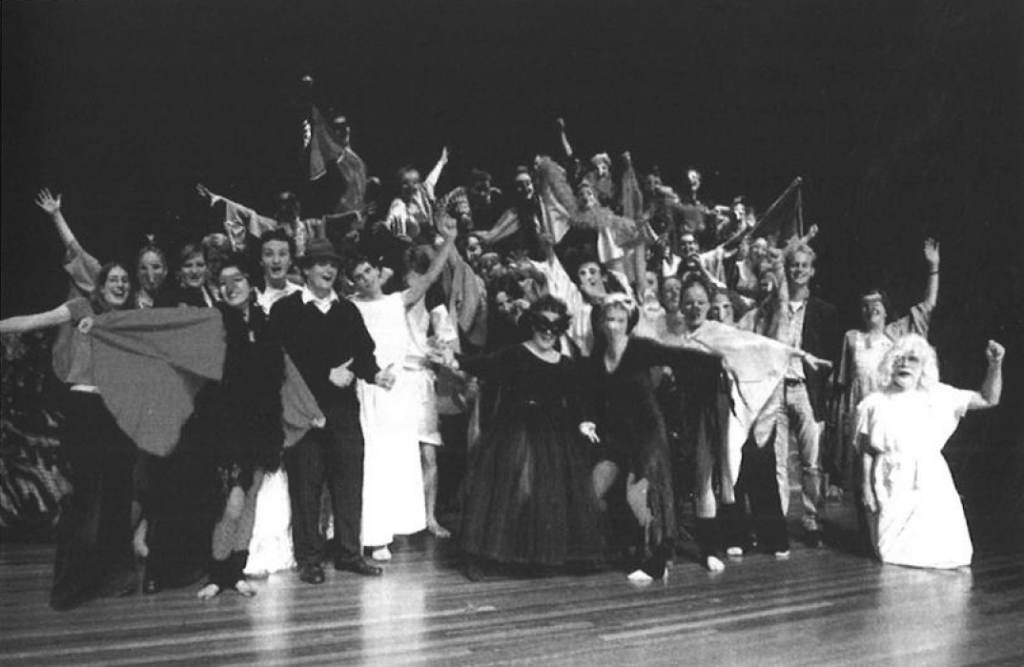
However, it would take a few more years before actual production of the Birds started. Myrthe Bartels formed a committee with Miriam Vallinga and Daniël Bartelds at the end of 2003 and a piece was chosen: the Birds. The performances would ultimately take place on May 26 and June 2, 2005.
2008 – Aristophanes’ Women's Festival
The performances of Aristophanes' Women's Festival took place on May 9 and 10, 2008. In retrospect, the beginning and end of theater traditions. It was the beginning of a new tradition, because with the Women's Festival Christoph Pieper made his entrance into the training theater of Classical Languages as a director. After the Women's Festival, Christoph Pieper would direct three more plays. At the same time, the Women's Festival also brought a (temporary) end to the comedy tradition within the course: the five plays that would follow the Women's Festival were all tragedies.
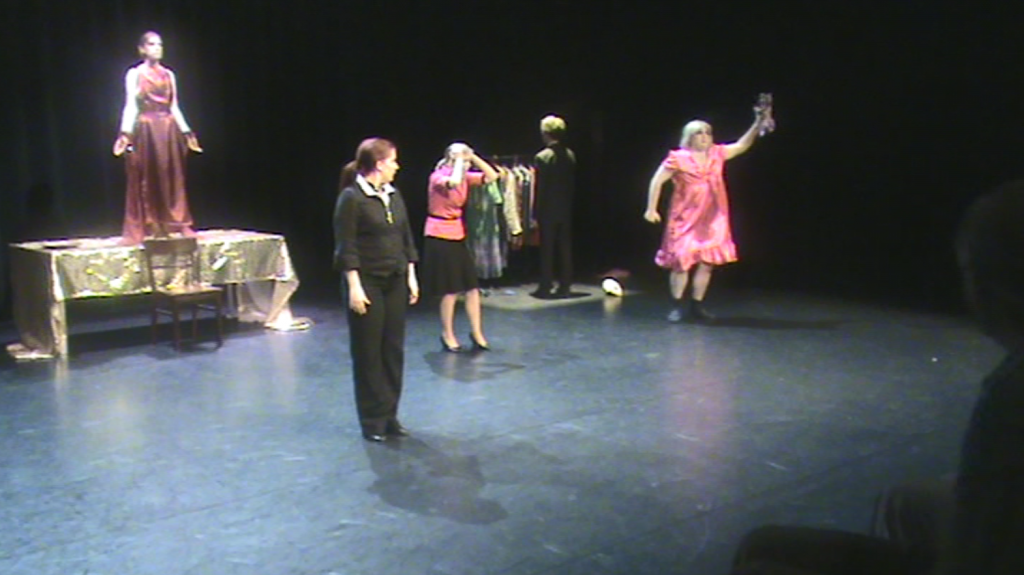
Perhaps one of the reasons why tragedies were chosen in particular after the Women's Festival is the time that needs to be put into a good translation: after all, a comedy has to be funny. Maarten Pieterse, who formed the production team together with Sophie Baltis and Michel den Uijl, wrote the following about it in the Frons (27:5):
“The relief was great when the redeeming word 'done!' resounded in the otherwise quiet house. (…) [T]he reason for joy was great, because a twenty-page script had seen the light. Yet a voice inside me said: 'Is this it?' Was this the result of having recited plays to each other for several hours with a dry throat, burning forehead and writer's cramp because changes had to be kept up with a pen or pencil? The result of staring at computer screens for hours until we saw stars dancing before our eyes? (…) All that work clearly had a purpose and it resulted in a funny piece of text that has a clear plot.”
2010 – Seneca’s Women of Troy
The performances of Women of Troy took place in the summer of 2010: the first real tragedy that the program staged. In the program booklet, the committee, Roos Bannenberg, Oscar Fernandez, Rosemarijn Verdenius and Adinda de Vries, looked back on the previous months.
“About a year and a half ago, during a Latin lecture, four second-year Classical Languages students were thinking back with nostalgia about The Women's Festival, the play that had been staged by our department the year before and became a great success. We immediately agreed: this tradition had to be continued, there had to be a new play! After much brainstorming and reading, Seneca's Troades was chosen. This choice was both a continuation of and a break with the theater tradition of the Classical Languages course: in the past, a Greek comedy was almost always performed, and we opted for a Latin tragedy. A big but exciting challenge! (…) Now, almost twenty months after that particular Latin lecture, the time has finally come. Today the theater group of the Classical Languages course presents you our new performance: Women of Troy. The final play that you will see today has remained largely faithful to Seneca's words and imagination, but we have also consciously chosen to add a contemporary touch here and there. After all, war today is still as terrible as it was in the time of the Greeks.”

2012 – Euripides’ Hippolytos
Performances of Euripides' Hippolytos took place on June 8 and 9. More than a year and a half earlier, Berber van der Oord, Guus van Loon, Niels van der Salm and Renske Janssen had started preparing the piece as a committee. In the program booklet of the performance, Christoph Pieper, the director, looked back on the process of creating the piece:
“It remains a challenge to stage a classic play for modern spectators (and not just for colleagues). At the beginning is the search for common ground with our own time; you need an initial idea that can serve as a common thread through the piece. In the case of the Hippolytos, I did not see this common thread in one of the main characters, but in the figure of the choir leader. Suddenly I imagined him as a journalist who makes his money with juicy reports about the royal family. From this idea all other figures developed: the nurse as his best informant, Phaidra as a victim of media hype (...), Theseus as a tyrannical ruler who tries to censor the press...
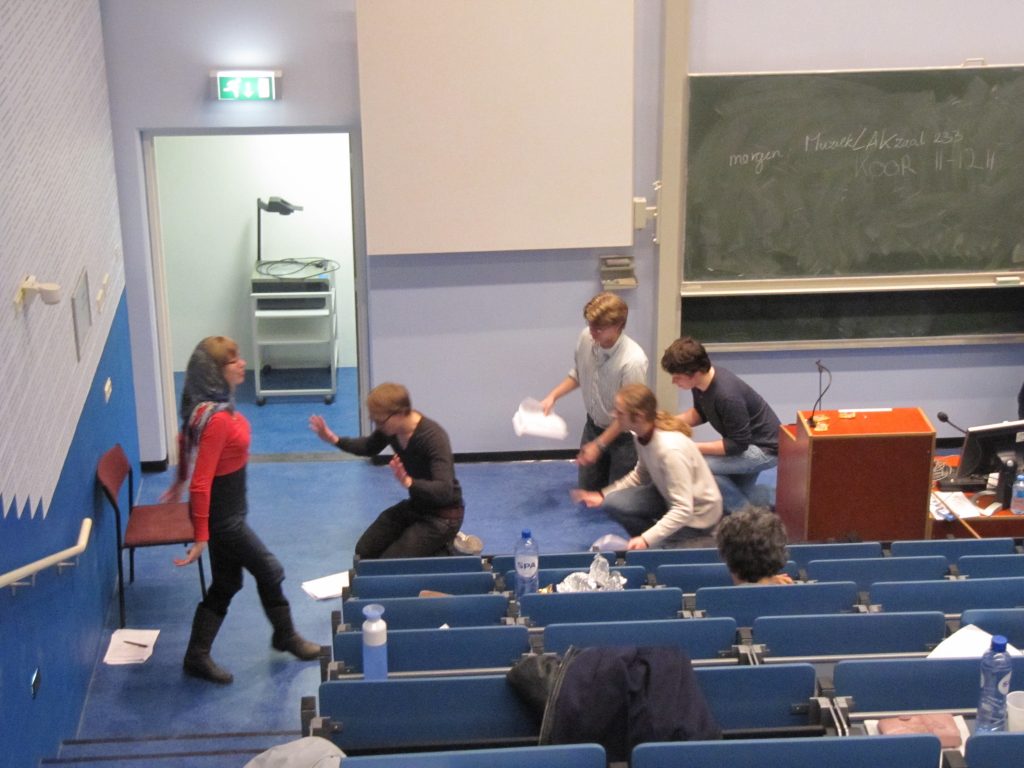
The performances took place, as has been the case for years, in the LAK theater. In 2012 it was decided that the LAK theater had to close its doors. The Hippolytos was one of the last performances played there and the announcement of the play was included in the very last, black-colored program of the LAK theater.
2014 – Sophocles’ Elektra
A few months before the premiere of the Hippolytos, Sophia Aeterna was founded. A large and long-term project such as organizing a theater performance suited the new study association very well. At the first GA on September 26, 2012, the first Sophia theater committee was introduced, consisting of Kaylee Branse, Leonie Henkes, Sanne Boomsma and Renske Jansen. Although the stage production fell under the responsibility of Sophia from this moment on, little changed in the actual production. In December 2013 it was announced that the committee had chosen Sophocles's Elektra to be performed in June 2014, and soon a large number of students, as usual, were poring over their own piece of Sophocles.
However, not everything could stay the same. Christoph Pieper, who had directed the previous pieces, had no time this time due to his research. A search for another director ultimately ended with Remy van Etteger, a friend of Leonie who directed her own theater group. A new theater also had to be found: the former theater hall of the LAK had now been turned into a lecture hall. Fortunately, there were enough suitable theaters and the Imperium Theater on the Oude Vest was soon established. The play itself was presented as classically as possible: the script was fairly faithful to the original Greek and the clothing and decor were strongly classically oriented. This strategy was successful: the Saturday evening performance would eventually be sold out, while there were only a few tickets left for the Friday evening performance and the Saturday matinee performance was also well attended.

2016 – Pseudo-Seneca’s Octavia
In 2015, the new theater committee, formed by Alisha Meeder, Bob van Velthoven, Daan Mulder, Erik-Jan Dros and Fleur Wetsema, was faced with a difficult decision. They wanted to do something different from previous years, but they would perform a Latin tragedy in instead of a Greek or rather a comedy? After much deliberation, the first was chosen. The final piece was chosen by the director, a task that Christoph Pieper had once again taken on this year: it would become pseudo-Seneca's Octavia. The choice for the Octavia meant that translation had to be done in a completely different way than was the case with the Elektra. Pseudo-Seneca's Octavia is a fairly boring piece and it was therefore the task of the translators, committee and director to translate in such a way that there would be more momentum and tension in the piece.
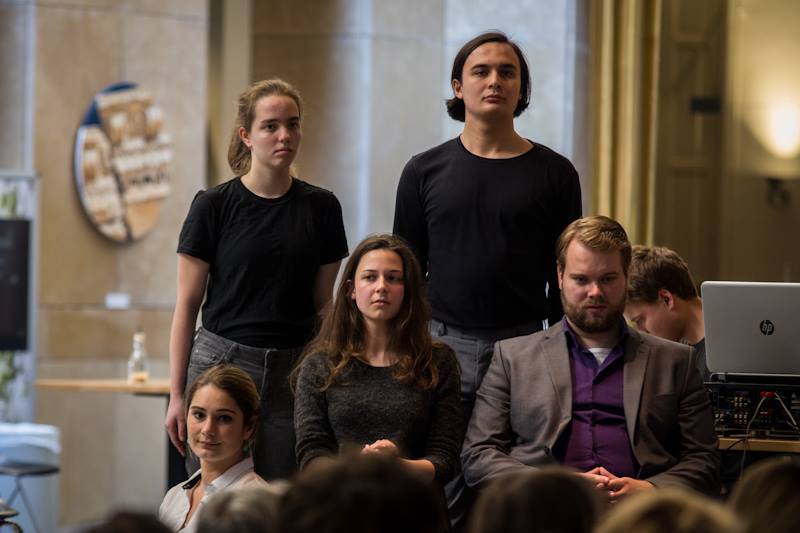
The imperial couple and their entourage (from left to right, from top to bottom: Aniek Vink (soldier), Roöni Hagendoorn (prefect), Bettina Kavelaars (nurse),
Kirsten Haijes (Poppaea) and Tom Zwanenburg (Nero)
After a short preview had been given in the Temple Hall of the RMO during the Week of the Classics, the actual performances took place on Friday 3 and Saturday 4 June. The play revolves around the events surrounding Nero's divorce from Octavia and his new marriage to Poppaea, which alienates the emperor not only from his ex-wife, but also from his mentor Seneca. The stage image was formed by two circles: on one side Octavia's circle of pillows, on the other side Seneca's circle of books.
2018 – Sophokles’ Antigone
Although the Octavia was a great success, the new theater committee, consisting of Henric Jansen, Hubert Mooiman, Anja Oomis and Benjamin Plomp, decided to return to Greek tragedy. After a short consultation, Sophocles' Antigone was chosen, a text that is regularly read within the course. Bart Vieveen, dramaturge and headmaster of the Stedelijk Gymnasium Leiden, was appointed as director and a committee of ten translators quickly got to work on the 1353-verse drama. After thorough editing by Dutch scholar Dick Dallinga, rehearsals started in October 2017. The previously four-member committee had now recruited Kirsten Haijes and Indira Huliselan as additional members, because the number of four committee members proved to be insufficient for this large project, in which no fewer than 35 people participated.
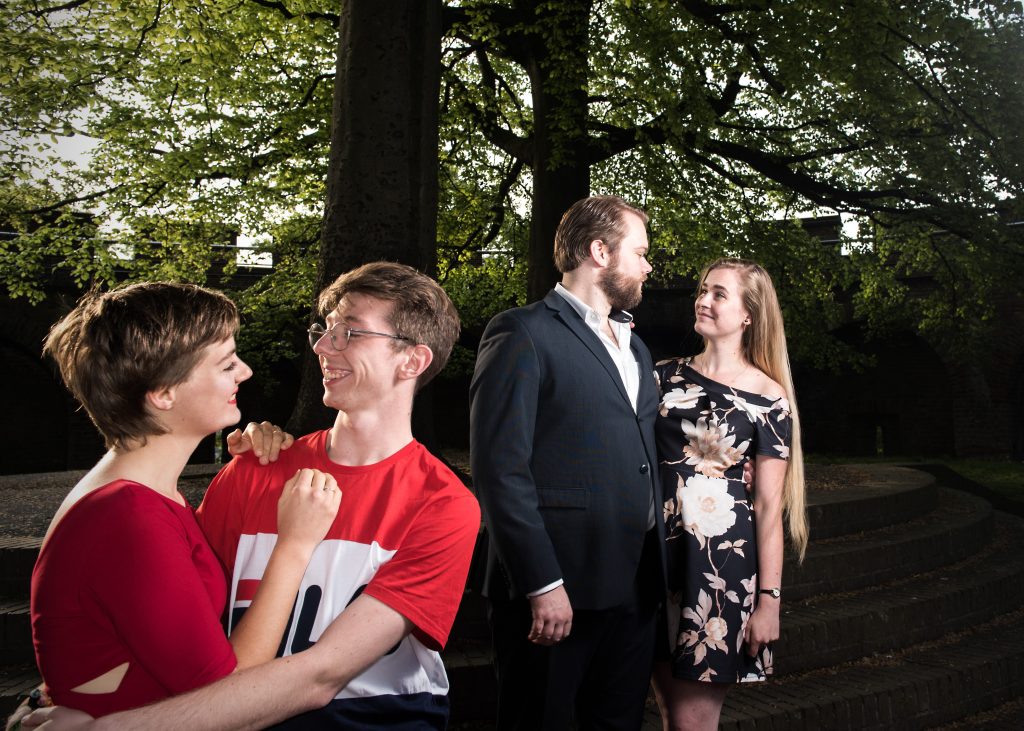
During the Week of the Classics, at the request of Casper de Jonge, a preview was once again given in the National Museum of Antiquities. Two months later the play was performed three times in a packed Theater Ins Blau. Antigone (Daphne van Abswoude) and Ismene (Marianne Bakker) started their dialogue from the audience. Then came “that scary Creon” (Tom Zwanenburg), who at first did not seem to understand the six tips for novice managers, but later positioned himself as an authoritarian ruler. In between, the choir members sang catchy songs about πολλὰ τὰ δεινά and Love that conquers all. A hilarious Wachter (Youp Theunisz), a sympathetic Haimon (Frank van den Boom) and a crazy Teiresias (Thom van Leuveren) passed by, and the tragedy of Creon's fate was reinforced by an emotional Eurydike (Louise van Dijl), a laconic messenger (Perry Nicolaas) and two extremely relativizing choir leaders (Iris de Smalen and Roöni Hagendoorn).
2021 – Seneca’s Thyestes
The next committee was in the mood for a bloody family drama. That is why Hubert Mooiman, Meike Rozenbrand, Iris de Smalen, Bob van Velthoven and Louise van der Vlugt have chosen to bring the Thyestes to the Leiden audience. Once again, Bart Vieveen, dramaturge and headmaster of the Stedelijk Gymnasium Leiden, was asked to oversee the play as director. Everything was running smoothly for performances in June 2020, when suddenly Corona came into play. So we see that a piece that is over two thousand years old can still be felled by a miserable pandemic. The plans were changed so that the Thyestes could get as beautiful a ten statue as it deserved.
This resulted in a prize-winning piece of theater: the Thyestes was performed without an audience, but in front of a camera. The play was thus made into a film and a teaching package was even created around it. All this hard work by the committee and other involved parties was certainly recognized: in 2022, the Thyestes, together with the associated teaching package, was rewarded with the Daidalos Trophy! But the performance has also been highly appreciated within Sophia Aeterna: there was even a second major screening in 2022, so that the new first-year students could also admire the piece.